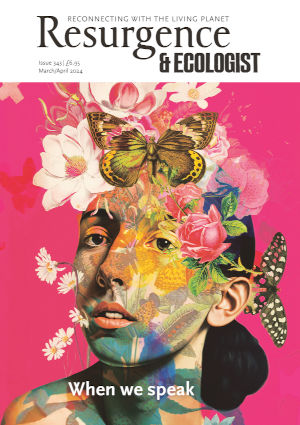I read Our Fragile Moment – the distinguished climate scientist Michael Mann’s latest book on the climate crisis – over the days and weeks leading up to COP28, which was hosted by the UAE; and I am writing these words a day or two before the close of the conference in Dubai, with much controversy in the air about the likely shape of the outcome. The book, which offers a sweeping and magisterial account of how humanity and the natural world have survived, suffered and even occasionally thrived in previous periods of significant climate change, concludes with a largely hopeful chapter about how we could still navigate the ‘fragile moment’ we currently face with concerted action to address climate change and shift to a more sustainable world. Its ultimately uplifting and enabling message feels more important than ever at a time when nations are divided, multilateralism is struggling to deliver, and the fate of the planet hangs in the balance.
This juxtaposition between the opportunity before us to steer humanity and the planet onto a safer course and the trajectory we are currently on – both starkly described in the book – was brought into sharp relief at COP28. On the eve of the convention, the UN Secretary General, António Guterres, who has been an outspoken and dogged campaigner on climate, issued an impassioned plea for climate action from the depths of Antarctica, amid the melting ice.
The US and China had met in Sunnylands, California last November and struck what felt like a meaningful bilateral deal to work together again to address the climate crisis, including on methane, but then announced that neither of their two heads of state would be present at the COP. A BBC exposé then showed that the presidency of COP28 planned to use side meetings in Dubai to pursue bilateral deals with countries on oil and gas, though the COP president, Sultan Al Jaber, refuted these claims and promised to act neutrally in the interests of a positive outcome. Donald Trump reared back into view as a frontrunner for US president in 2024, while libertarian candidates Geert Wilders and Javier Milei succeeded in the Dutch and Argentinian elections respect-ively. Meanwhile, in the UK, prime minister Rishi Sunak continued to call the UK’s net zero trajectory into question, while observers noted that he spent more time on the plane to the COP and back than he did speaking to his peers on the ground in Dubai.
Throughout the COP, Mann’s was an important voice, including, as one of the key climate scientists, responding to a leaked video of the COP president challenging Mary Robinson and appearing to refute the key climate science on fossil fuels and the 1.5-degree target. In an interview for The Guardian, Mann summarised the essential message of the book: ”We haven’t yet exceeded the bounds of viable human civilisation, but we’re getting close. If we keep going [with carbon emissions], then all bets are off. We see examples of two duelling qualities, fragility and resilience. On the one hand, you find stabilising mechanisms that exist in the Earth’s climate, when life itself has helped keep the planet within bounds that are tailored to life. But there are examples where the Earth system did just the opposite, where it spun out of control, and did so because of life itself.”
As the COP comes to a faltering close, this central message of Our Fragile Moment has never felt more important. And, irrespective of the final agreement, it is in our collective power, as citizens, to play our full part in holding our leaders to account and shifting our societies in the direction of powerful, effective climate action.
Our Fragile Moment: How Lessons from the Earth’s Past Can Help Us Survive the Climate Crisis by Michael Mann. Scribe, 2023. ISBN: 9781915590510.







